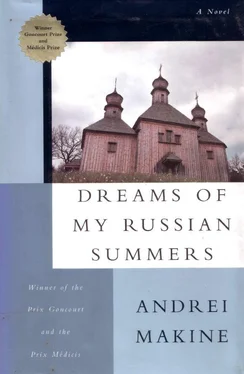This present tense, this time in which actions were repeated indefinitely, was of course an optical illusion. But it was thanks to this illusory perception that we discovered several essential character traits in the inhabitants of our Atlantis. The streets of Paris, in our stories, were constantly shaken by bomb explosions. The anarchists who threw them must have been as numerous as the grisettes or the coachmen in their cabs. For me the names of some of these enemies of the social order will for a long time evoke the roar of an explosion or the sound of gunfire: Ravachol, Sante Caserio…
Yes, it was in these tempestuous streets that one of the peculiarities of this people became clear to us: they were always busy making demands; never content with the status quo already achieved; ready at any moment to surge into the thoroughfares of their city, to unseat, to agitate, to insist. In the perfect social calm of our own fatherland these Frenchmen had the look of born rebels, dedicated demonstrators, professional moaners. And the Siberian suitcase containing newspapers that spoke of strikes, assassination attempts, and fights on the barricades seemed itself to be like a great bomb ticking away amid the somnolent tranquillity of Saranza.
And then a few streets further on from the explosions, still in this present, which never passed away, we came upon a quiet little bistro, the name of which Charlotte spelled out to us, smilingly, as she recalled it: Au Ratafia de Neuilly "This ratafia," she would elaborate, "the patron served it in silver scallop dishes…"
So the people of our Atlantis could feel sentimental attachment to a café, love its name, and discern an atmosphere that was special to it. And for their whole lives retain the memory that it was there, at the corner of a street, that one drank ratafia from silver scallop dishes. Yes, not from thick tumblers, nor from goblets, but from these fine dishes. It was our new discovery: this occult science that linked the place of refreshments, the ritual of the meal, and its psychological tonality.
"In their minds, do their favorite bistros have a soul?" we wondered, "or at least a face of their own?"
There was only one café in Saranza. Despite its pretty name, Snowflake, it did not arouse any special emotion in us, any more than the furniture shop next door or the savings bank opposite. It closed at eight o'clock in the evening, and then it was its dark interior, with the blue eye of a nightlight, which inspired our curiosity. And as for the five or six restaurants in the city on the Volga where our family lived, they were all identical: at seven o'clock precisely the doorkeeper opened the doors to an impatient crowd; and a combination of earsplitting music and the smell of burned fat spilled into the street; at eleven o'clock the same crowd, muted and fuddled, streamed out onto the front steps, near which a flashing police light added a note of fantasy to this immutable rhythm…
"The silver scallop dishes au Ratafia de Neuilly" we repeated to ourselves silently.
Charlotte explained the composition of this unusual drink to us. Her account very naturally brought us to the universe of wines. And it was there, enthralled by a colorful tide of appellations, aromas, and bouquets, that we became acquainted with these extraordinary entities, each with their nuances that the palate could distinguish. And this too was the work of these builders of barricades! Thinking about the labels on a few bottles displayed on the shelves of the Snowflake, we had to admit that they were all French names: Shampanskoye , Konyak, Silvaner, Aligoté, Muskat, Kahor…
Yes, most of all it was this contradiction that left us perplexed: that these anarchists had managed to elaborate such a coherent and complex system of drinks. And what is more, all these innumerable wines, according to Charlotte, formed infinite combinations with cheeses! And the latter in their turn added up to a veritable cheese encyclopedia of tastes, of local colors, of individual humors, almost… Rabelais, who often haunted our evenings on the steppes, had not lied.
We were discovering that a meal, yes, the simple intake of food, could become a theatrical production, a liturgy, an art. As at the Café Anglais on the boulevard des Italiens, where Charlotte's uncle often dined with his friends. It was he who told his niece the story of that incredible bill of ten thousand francs for a hundred… frogs! "It was very cold," he recalled; "all the rivers were covered in ice. They had to summon fifty workmen to disembowel that glacier and find the frogs…" I did not know what amazed us most: this unimaginable dish, contrary to all our own gastronomic notions, or the regiment of muzhiks (which is how we pictured them) busy splitting blocks of ice on the frozen Seine.
In truth, we were beginning to lose our heads: the Louvre; Le Cid at the Comédie-Française; the barricades; the shoot-out in the catacombs; the Académie Française; the deputies in a boat; and the comet; and the chandeliers, falling one after the other; and the Niagara of wines; and the president's last embrace… And the frogs disturbed in their winter sleep! We were up against a people with a fabulous multiplicity of sentiments, attitudes, and viewpoints, as well as manners of speaking, creating, and loving.
And then there was also the celebrated chef, Urbain Dubois, Charlotte told us, who had dedicated a shrimp and asparagus soup to Sarah Bernhardt. This obliged us to picture a borscht being dedicated to someone, like a book… One day we followed a young dandy through the streets of Atlantis; he walked into Chez Weber, a very fashionable café, according to Charlotte's uncle. He ordered what he always ordered: a bunch of grapes and a glass of water. It was Marcel Proust. We contemplated the grapes and the water, which, under our fascinated gaze, became transformed into fare of unequaled elegance. So it was not the variety of wines or the Rabelaisian abundance of food that counted, but…
We thought again about that French spirit, the mystery of which we strove to fathom. And Charlotte, as if she desired to make our investigations even more frenzied, was already telling us about the Restaurant Paillard on the rue de la Chaussée d'Antin, where the princesse de Caraman-Chimay eloped one evening with the Gypsy violinist Rigo…
Without daring to believe it yet, I asked myself a silent question: might not this much-sought-after French quintessence have as its source – love? For all roads in our Atlantis seemed to lead to the domain of Cupid.
Saranza was sinking into the aromatic night of the steppes. Its scents were mingled with the perfume that embalmed a woman's body swathed in precious stones and ermine. Charlotte was telling of the escapades of the divine Otero. With incredulous astonishment I contemplated this last great courtesan, all curves on her couch with its capricious shapes. Her extravagant life was devoted only to love. And around this throne buzzed men – some counting the last few louis d'or of their lost fortunes, others slowly raising the barrels of their revolvers to their temples. And even in this final gesture they could display an elegance worthy of Proust's bunch of grapes. One of these unhappy lovers committed suicide on the very spot where he had first set eyes on Caroline Otero!
In this exotic country, moreover, the cult of love knew no social boundaries: far from the boudoirs brimming with luxury, over in the working-class suburb of Belleville, we saw two rival gangs kill one another because of a woman. Sole difference: the beautiful Otero's locks had the sheen of a raven's wing, while the tresses of this disputed lover glowed like ripe corn in the setting sun. The bandits of Belleville called her "Casque d'or. "
At that moment our critical sense rebelled. We were prepared to believe in the existence of frog eaters, but fancy gangsters slitting one another's throats over a woman's pretty face!
Читать дальше












